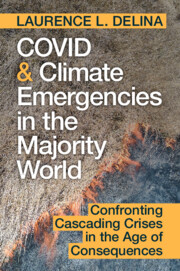 COVID and Climate Emergencies in the Majority World
COVID and Climate Emergencies in the Majority World Book contents
- COVID and Climate Emergencies in the Majority World
- Reviews
- COVID and Climate Emergencies in the Majority World
- Copyright page
- Dedication
- Contents
- Preface
- Acknowledgements
- 1 Portrait of a Grief
- 2 Collapsing Dominoes
- 3 Vulnerabilities Amplified
- 4 Walled World
- 5 Obscene Opulence
- 6 Climate Nationalism
- 7 Toggling the System
- 8 Decluttering Consumption
- 9 Confronting Neo-Liberalism
- 10 Ceasing Arrogance
- 11 Making Amends
- 12 Collective Solidarities
- 13 Decolonising from Within
- 14 Indigenous Epistemology
- 15 Communicating Risks
- 16 The Hubris of Control
- 17 Mobilising the 3.5 Per Cent
- Index
- References
13 - Decolonising from Within
Published online by Cambridge University Press: 22 June 2023
- COVID and Climate Emergencies in the Majority World
- Reviews
- COVID and Climate Emergencies in the Majority World
- Copyright page
- Dedication
- Contents
- Preface
- Acknowledgements
- 1 Portrait of a Grief
- 2 Collapsing Dominoes
- 3 Vulnerabilities Amplified
- 4 Walled World
- 5 Obscene Opulence
- 6 Climate Nationalism
- 7 Toggling the System
- 8 Decluttering Consumption
- 9 Confronting Neo-Liberalism
- 10 Ceasing Arrogance
- 11 Making Amends
- 12 Collective Solidarities
- 13 Decolonising from Within
- 14 Indigenous Epistemology
- 15 Communicating Risks
- 16 The Hubris of Control
- 17 Mobilising the 3.5 Per Cent
- Index
- References
Summary
The failure of stewardship by many colonialists is so profound that their blunder and neglect essentially mirror the same political and market forces that drive the climate crisis. Decolonising climate action thus requires the recognition, acknowledgement, and closure of histories of racism and greed.
Keywords
- Type
- Chapter
- Information
- COVID and Climate Emergencies in the Majority WorldConfronting Cascading Crises in the Age of Consequences, pp. 116 - 122Publisher: Cambridge University PressPrint publication year: 2023


